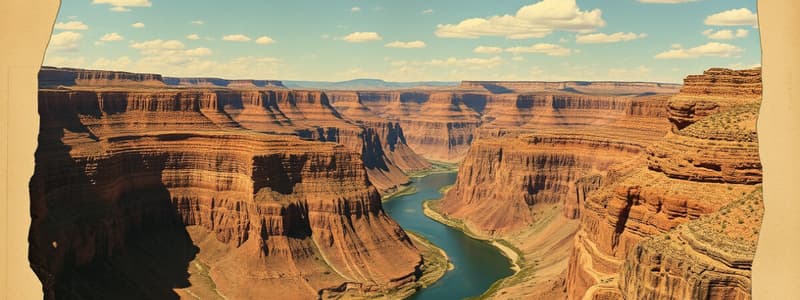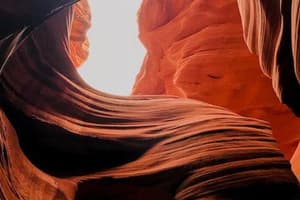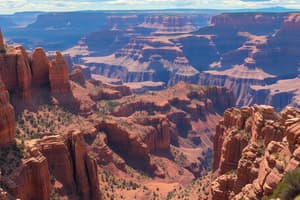Podcast
Questions and Answers
What is the depth of the Grand Canyon?
What is the depth of the Grand Canyon?
- Approximately 3 miles
- Approximately 500 feet
- Approximately 2 miles
- Approximately 1 mile (correct)
Who led the first river rafting expedition through the Grand Canyon?
Who led the first river rafting expedition through the Grand Canyon?
- Teddy Roosevelt
- Marcellus B. Jones
- Lewis and Clark
- John Wesley Powell (correct)
How long did the first river rafting expedition last?
How long did the first river rafting expedition last?
- 50 days
- 98 days (correct)
- 30 days
- 125 days
How can visitors reach the bottom of the Grand Canyon?
How can visitors reach the bottom of the Grand Canyon?
What age is the oldest rock layer at the bottom of the Grand Canyon?
What age is the oldest rock layer at the bottom of the Grand Canyon?
What significant geological feature stands 290 feet high?
What significant geological feature stands 290 feet high?
What important lesson does Inspector Gadget's trip highlight?
What important lesson does Inspector Gadget's trip highlight?
Which tribe has historical significance in the Grand Canyon area?
Which tribe has historical significance in the Grand Canyon area?
Which natural feature is deeper than a 50-story building?
Which natural feature is deeper than a 50-story building?
In which states is Monument Valley located?
In which states is Monument Valley located?
Flashcards are hidden until you start studying
Study Notes
Inspector Gadget's Field Trip Overview
- Inspector Gadget embarks on an adventure starting at Grand Central Station in New York City, later discovering he is actually at the Grand Canyon.
- The Grand Canyon measures approximately 280 miles long and is the world's largest canyon.
Formation and Geology of the Grand Canyon
- The Grand Canyon is over a mile deep and formed by the erosion caused by the Colorado River over the last 6 million years.
- The oldest rock layer at the canyon's bottom is 1.2 billion years old, showcasing various layers from different geological eras.
Accessing the Grand Canyon
- Visitors can reach the canyon's bottom either by foot or via mules, with a trek taking an entire day.
- Riding mules is a traditional method for descending the canyon, emphasizing safety and enjoyment for travelers.
Historical Significance
- The first river rafting expedition through the Grand Canyon was led by explorer John Wesley Powell in 1871, lasting 98 days.
- Native American cultures, including the Hopi tribe, have inhabited the area for over 11,000 years, leaving behind artifacts like ancient stick figure drawings.
Other Natural Wonders
- The field trip includes exploring natural features like Carlsbad Caverns in New Mexico, deeper than a 50-story building, revealing stunning limestone formations.
- The Rainbow Bridge, a natural sandstone structure, is a significant sacred site for the Navajo tribe and stands 290 feet high.
Monument Valley
- Monument Valley stretches across Arizona and Utah, recognized as a Navajo Nation Tribal Park.
- The area showcases iconic sandstone formations shaped by natural erosion, contributing to its visual familiarity.
Conclusion
- Inspector Gadget's trip highlights the majestic natural wonders of the American Southwest, providing educational insight into geological processes and cultural history.
- The adventure emphasizes the importance of nature conservation and appreciation through exploration.
Inspector Gadget's Field Trip Overview
- Inspector Gadget's adventure starts at Grand Central Station, New York City, but he later finds himself at the Grand Canyon.
- The Grand Canyon is the world's largest canyon, stretching approximately 280 miles in length.
Formation and Geology of the Grand Canyon
- The Grand Canyon has a depth exceeding one mile and was formed by the erosive power of the Colorado River over the past 6 million years.
- The oldest rock layers at the canyon's bottom are about 1.2 billion years old, representing various geological eras.
Accessing the Grand Canyon
- Travelers can access the canyon's bottom on foot or by riding mules, with the trek taking a full day.
- Mule riding is a traditional and safe method for descending into the canyon, enhancing the visitor experience.
Historical Significance
- The first river rafting expedition through the Grand Canyon was conducted by explorer John Wesley Powell in 1871, lasting 98 days.
- Native American tribes, particularly the Hopi, have lived in the region for over 11,000 years and left historical artifacts, including stick figure drawings.
Other Natural Wonders
- The journey includes a visit to Carlsbad Caverns in New Mexico, which is deeper than a 50-story building and features magnificent limestone formations.
- Rainbow Bridge, a 290-foot high natural sandstone structure, is a sacred site for the Navajo tribe.
Monument Valley
- Monument Valley is located in both Arizona and Utah and is recognized as a Navajo Nation Tribal Park.
- The park is famous for its iconic sandstone formations shaped by natural erosion, contributing to its well-known landscape.
Conclusion
- Inspector Gadget's trip reveals the extraordinary natural wonders of the American Southwest, emphasizing educational insights into geology and cultural history.
- The adventure underscores the importance of nature conservation and the value of exploration and appreciation of the environment.
Studying That Suits You
Use AI to generate personalized quizzes and flashcards to suit your learning preferences.



